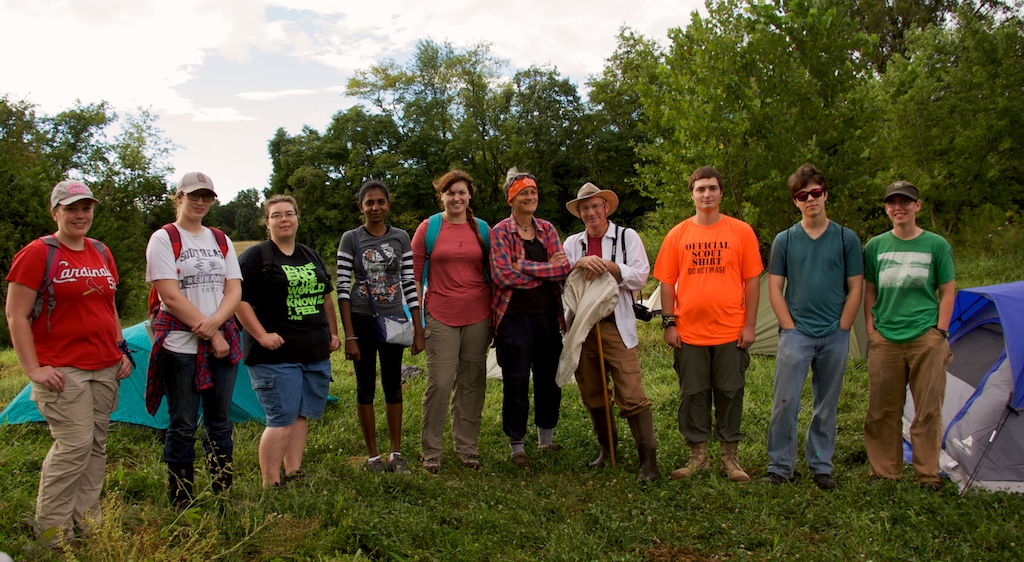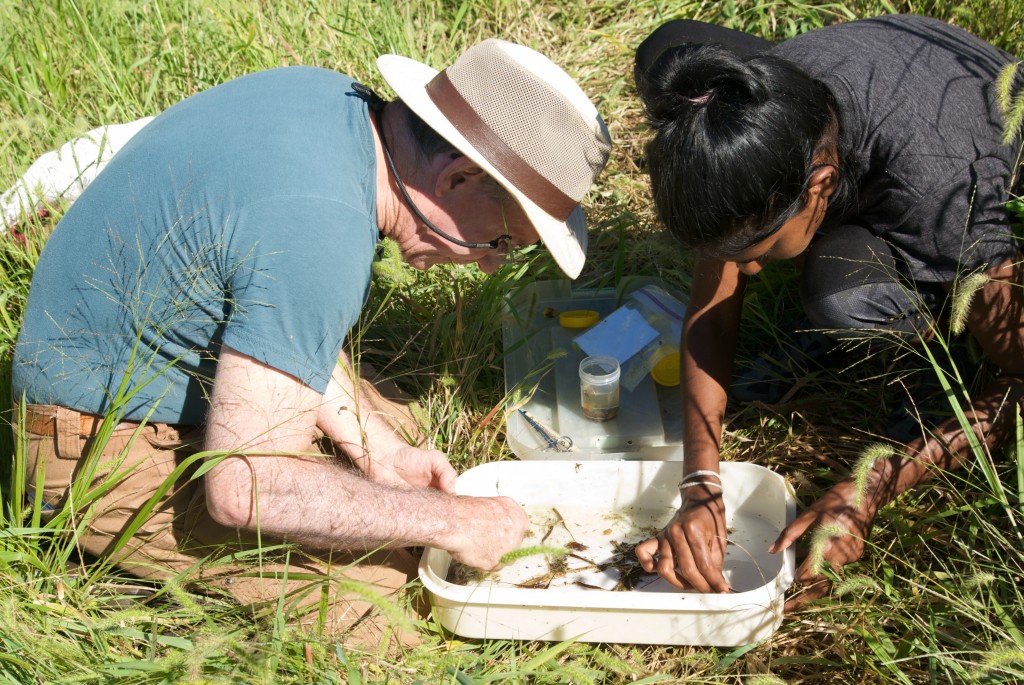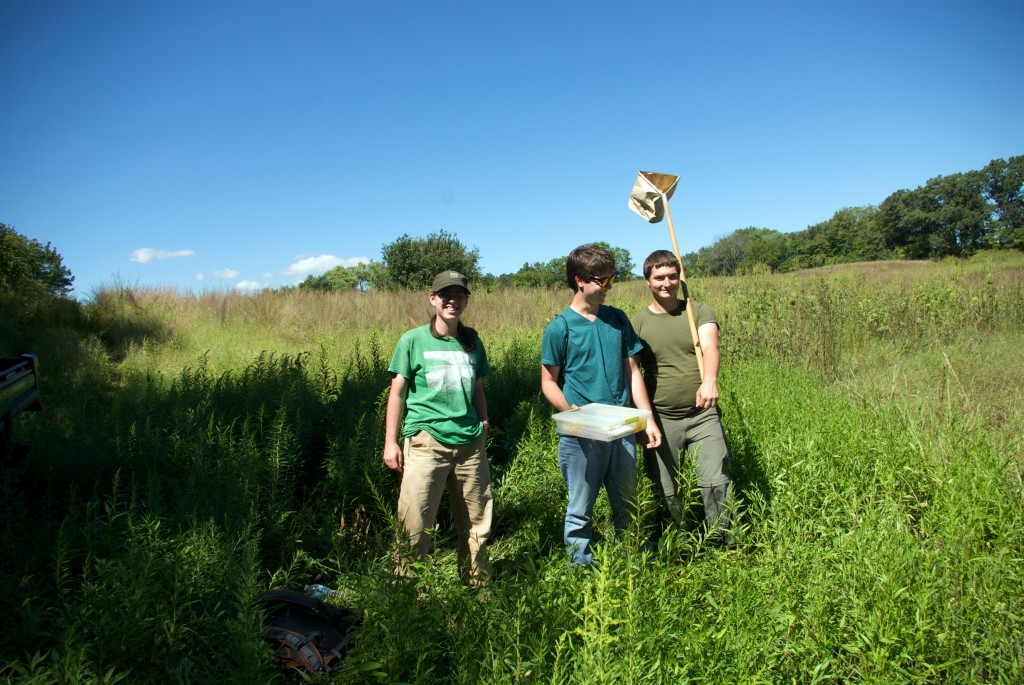SEMO Students Look at Aquatic Life at Wightman Nature Preserve

SEMO Aquatic Entomology class members assemble to collect samples from ponds at the Paul Wightman Subterranean Nature Preserve. Pictured from left to right are: Jill Bryant, Alyssa Trewatha, Abby Pennock, Hansani Pathmakumara, Becca Spears, Diane Wood, Allen Gathman, Zack Kuehn, Tristan Farrell and Brooke Grubb. Photo courtesy Pen DauBach, Clifftop.
Glop, gloop, goo. Muck, mire, mud. Ooze, sludge, slime.
And glorious, gorgeous, grand life-teaming samples scooped up into dip nets ably wielded by students seeking to learn “what’s here.” Southeast Missouri State University (SEMO) students eagerly walked around and waded into ponds catching and caching numerous samples to begin analysis and basic research.
In early fall, Dr. Diane Wood’s aquatic entomology class descended on the ponds of the Paul Wightman Subterranean Nature Preserve with one thing in mind, “What sort of aquatic, six-legged critters are making their home at the preserve?” The intent was two-fold, to provide the students with an opportunity for “hands-on” experience to re-enforce what they were learning in the classroom and, in turn, benefit Clifftop by providing an initial taxonomic survey of the aquatic insects living in the ponds.
In the very last days of 2013 Clifftop purchased the 535-acre property now named the Paul Wightman Subterranean Nature Preserve with the overarching goal of improving the quality of ground water entering the underlying Fogelpole Cave system, our state’s largest and most biologically diverse cave.
Science underpins our every effort at Wightman and informs and guides our management practices to enhance and improve wildlife habitat. As early as January 2014, a consortium of universities, colleges and agencies immediately began to establish baseline biodiversity survey data on the preserve to catalog what kinds of creatures, critters and plants were living on the preserve and within the cave system while the surface was actively being farmed. Then, 20 months ago, we converted nearly 300 acres of tilled farm ground into a large, pollinator-friendly prairie, with 12 species of native grasses and sedges, and 42 species of flowers. The prairie planting serves to quickly improve the quality and constituents of surface water runoff. The preserve also features 36 sinkhole ponds and 200 dry wooded sinkhole features, all characteristic of highly erodible karst terrain. The ongoing science surveys will continue over the next decade in order to measure water quality and land use influences on changes in biota on the landscape.
The wealth of sinkhole ponds on the property affords wonderful opportunities for studies. Initial reptile and amphibian surveys are completed, and Illinois Department of Natural Resources fish biologists plan to do surveys in 2017. But, we really wanted to look at aquatic insect biodiversity.

Allen Gathman and Hansani Pathmakumara work on initial identification of specimens. Photo courtesy Pen DauBach, Clifftop.
Insects are the most important component of an aquatic food web. They eat plants, and fish, amphibians, waterfowl and birds eat them. Aquatic insects are used to control aquatic weeds; they’re used to measure the water quality of waterways; they are great at mosquito control (bug eats bug); are employed in toxics studies for herbicide and pesticide development; can be real pests; but are the love of avid fly fishermen.
Dr. Diane Wood, Professor of Biology at SEMO, and Clifftop have developed a solid relationship – a symbiosis of mutual benefits, to borrow the biological concept – over a number of years. For several years Clifftop and the Salt Lick Point Stewardship Committee have hosted Dr. Wood and groups of students at an annual “bluffscamp.” During the weeklong visits, students conduct hands-on boots-on stewardship at Clifftop’s White Rock Nature Preserve, the Wightman Preserve, and the Salt Lick Point Land & Water Reserve. The experience provides the students, many of who are considering careers in biology, wildlife management, or conservation, a close-in opportunity to contemplate land management and stewardship along with the blisters, backaches, and potential rewards of a life centered on the outdoor environment. Clifftop and the SLP Committee get to perform these introductions and watch as the students pitch in to clear some bush honeysuckle, help build trails, plant native seedlings, and do a host of activities. On our part the watching always includes admiration and envy of what youthful energy can accomplish.
This year, in addition to bluffscamp, Dr. Wood proposed concentrating her aquatic entomology class on researching the ponds at our Wightman Nature Preserve. The students collected samples during two days, with the goal of using their classroom time through the semester to identifying specimens as far down the taxonomic system as possible. Taxonomy, the systematic classification of biological organisms with each descending level more specific, includes the major components of kingdom, phylum, class, order, family, genus, species.

Brooke Grubb, Zack Kuehn, and Tristan Farrell ready to collect samples. Photo courtesy Pen DauBach, Clifftop.
Thus far, the students have completed identifications of the different insects to the family level, and continue to identify as many as possible to genus and/or species. In January, Dr. Wood and students will present a seminar on the results of their work. Their presentation, concerning the various insects collected from the Wightman ponds, will include a general discussion on how aquatic insects are able to go about the important business of breathing underwater, getting food, and reproducing to create next year’s generation of aquatic offspring.
Please join Clifftop as we learn “what’s in the ponds” at our Paul Wightman Subterranean Nature Preserve. The presentation will feature Dr. Diane Wood and students from her Aquatic Entomology course at Southeast Missouri State University. The seminar will be held from 1 to 3 pm on Saturday January 7th at the Monroe County Annex, 901 Illinois Street, Waterloo. The program is free and open to the public. Registrations are required by January 5th and may be made by email to cliffmbr@htc.net or by calling (618)-935-2542.
CLIFFTOP, a local nonprofit organization, is focused on preserving and protecting area bluff lands.
A version of this article appeared in the 16 December 2016 edition of the Monroe County Independent.
© 2016 all content rights reserved Clifftop NFP
Comments are currently closed.
